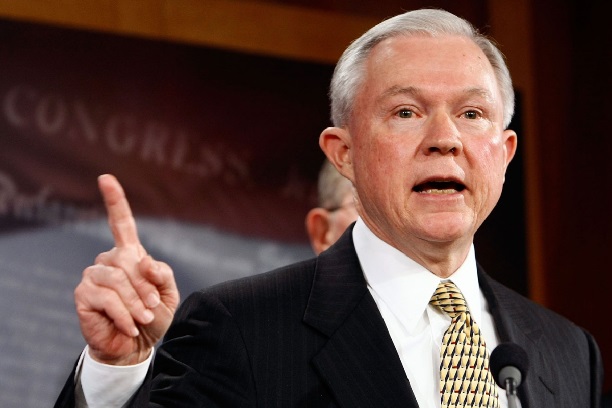Attorney General Jeff Sessions has removed himself from an FBI investigation into alleged Russian interference in the US election.
Democrats are demanding he go further and quit after it emerged he met Moscow's envoy during the US election.
America's top prosecutor had testified at his confirmation hearing in January that he had "no communications with the Russians".
Claims of Kremlin meddling in the vote have dogged President Donald Trump.
"I have decided to recuse myself from any existing or future investigations of any matters related in any way to the campaigns for President of the United States," Mr Sessions said in a statement.
In a news conference at the Justice Department in Washington DC, he said his comments at his confirmation hearing were "honest and correct as I understood it at the time".
"I appreciate that some take the view that this was a false comment. That is not my intent. That is not correct."
What's Mr Sessions accused of?
During the Senate hearing on 10 January, Mr Sessions was asked: "If there is any evidence that anyone affiliated with the Trump campaign communicated with the Russian government, in the course of this campaign, what will you do?"
Mr Sessions responded: "I'm not aware of any of those activities. I have been called a surrogate at a time or two in that campaign and I did not have communications with the Russians. And I'm unable to comment on it."
However, it has now emerged that Mr Sessions and Russia's ambassador to the US, Sergei Kislyak, held a private conversation in Mr Sessions' office in September and had spoken earlier in the summer at a meeting with several other ambassadors.
The former Alabama senator had meetings with more than 25 foreign ambassadors in the course of the year.
His meetings with Mr Kislyak came while he played a prominent part of Mr Trump's campaign team - the so-called surrogate - and amid growing reports of Russian meddling in the US election.
What did he talk about with the envoy?
At Thursday's news conference, Mr Sessions said he had spoken with the Russian ambassador as a US senator and not as Mr Trump's surrogate.
He said: "I never had meetings with Russian operatives or Russian intermediaries about the Trump campaign."
Mr Sessions said that during his conversations with the Russian ambassador, he told Mr Kislyak he had once been to Russia with a church group in 1991.
He said the envoy had told him he was not a believer himself, though he welcomed having "church people" visit his country.
Mr Sessions said they went on to talk about terrorism and then "somehow the subject of Ukraine came up".
What has President Trump said?
Speaking on a trip to an aircraft carrier in Virginia on Thursday, Mr Trump said he had "total confidence" in his attorney general.
He added that he "wasn't aware" Mr Sessions had held two meetings last year with the Russian envoy to the US.
Asked if he thought America's top prosecutor should recuse himself from the FBI investigation, he replied: "I don't think so."
"I think he probably did," Mr Trump added when asked if his attorney general had testified truthfully at his confirmation hearing.
What's the view on Capitol Hill?
Democratic members of the House Judiciary Committee have asked the FBI to launch a criminal investigation into whether Mr Sessions lied to Congress and committed perjury.
Democrats are calling on him to resign.
House of Representatives Democratic leader Nancy Pelosi said Mr Sessions had "lied under oath" and that "anything less than resignation or removal from office is unacceptable".
Several top Republicans broke ranks to say Mr Sessions should recuse himself from the Russia inquiry.
They included Republican Senators Marco Rubio, Lindsey Graham, Susan Collins and Rob Portman.
Could he be charged with perjury?
Prosecutors would have to show that Mr Sessions not only made false statements, but knowingly and wilfully misled members of the committee about an indisputable fact.
Mr Sessions emphasised on Thursday that he responded to the question he was asked, which he believed was about campaign-related contacts and not his diplomatic conversations as a senator.
Lawmakers "are not the most precise questioners. It's not like a deposition or grand jury, where a professional prosecutor is asking the questions", said Stanley Brand, a Washington-attorney and former House general counsel.
Mr Sessions voted to impeach former president Bill Clinton for perjury when he was accused of lying to a grand jury about his relationship with White House intern Monica Lewinsky.
"It is crucial to our system of justice that we demand the truth," Mr Sessions said in 1998 after Mr Clinton's acquittal.
How the Russia claims have dogged Trump
May 2016: Reports first emerge of hackers targeting the US Democratic Party. Over the next two months, reports suggest US intelligence agencies have traced the breaches to Russian hackers.
July 2016: Jeff Sessions meets Russia's envoy to the US Sergei Kislyak and several other ambassadors at an event on the sidelines of the Republican National Convention.
August 2016: Paul Manafort, Donald Trump's campaign manager, quits after an FBI investigation into his alleged ties to Russian interests in Ukraine and the US.
September 2016: Senator Sessions has a private meeting in his office with Mr Kislyak. The justice department says all meetings were linked to his work on the armed services committee.
October 2016: The US intelligence community release a unanimous statement formally accusing Russia of being behind the hacking of the Democratic Party. Mr Trump questions the findings. Over the coming months, more reports on the hacking emerge. The US intelligence agencies, the justice department and four Congressional committees are all currently investigating the allegations.
February 2017: Mike Flynn resigns as Mr Trump's new national security adviser after it emerges he discussed the potential lifting of sanctions against Russia with Mr Kislyak and then misleading Vice-President Mike Pence about the communication.
Â
Credit: BBC





